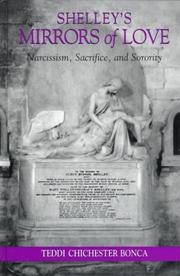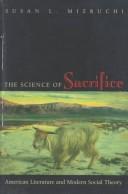| Listing 1 - 7 of 7 |
Sort by
|
Book
ISBN: 9783826036613 Year: 2007 Publisher: Würzburg Königshausen und Neumann
Abstract | Keywords | Export | Availability | Bookmark
 Loading...
Loading...Choose an application
- Reference Manager
- EndNote
- RefWorks (Direct export to RefWorks)
German literature --- Self in literature. --- Self-sacrifice in literature. --- History and criticism. --- Self in literature --- Self-sacrifice in literature --- History and criticism
Book
ISBN: 9780300233353 0300233353 0300240066 Year: 2018 Publisher: New Haven : Yale University Press,
Abstract | Keywords | Export | Availability | Bookmark
 Loading...
Loading...Choose an application
- Reference Manager
- EndNote
- RefWorks (Direct export to RefWorks)
A trenchant analysis of sacrifice as the foundation of the modern, as well as the ancient, social order The modern conception of sacrifice is at once cast as a victory of self-discipline over desire and condescended to as destructive and archaic abnegation. But even in the Old Testament, the dual natures of sacrifice, embodying both ritual slaughter and moral rectitude, were at odds. In this analysis, Terry Eagleton makes a compelling argument that the idea of sacrifice has long been misunderstood. Pursuing the complex lineage of sacrifice in a lyrical discourse, Eagleton focuses on the Old and New Testaments, offering a virtuosic analysis of the crucifixion, while drawing together a host of philosophers, theologians, and texts-from Hegel, Nietzsche, and Derrida to the Aeneid and The Wings of the Dove. Brilliant meditations on death and eros, Shakespeare and St. Paul, irony and hybridity explore the meaning of sacrifice in modernity, casting off misperceptions of barbarity to reconnect the radical idea to politics and revolution.
Sacrifice. --- Self-sacrifice. --- Sacrifice --- Self-sacrifice --- Sacrifice in literature. --- Self-sacrifice in literature. --- Altruism --- Burnt offering --- Worship --- Philosophy.
Book
ISBN: 9781139518826 1139518828 9781139108713 1139108719 1280774150 9781280774157 9781139515313 1139515314 9781107021266 110702126X 9786613684929 6613684929 9781107507609 110750760X 1107231477 1139508253 1139517899 1139514393 1139516965 9781107231474 9781139508254 9781139517898 9781139514392 9781139516969 Year: 2012 Publisher: New York Cambridge University Press
Abstract | Keywords | Export | Availability | Bookmark
 Loading...
Loading...Choose an application
- Reference Manager
- EndNote
- RefWorks (Direct export to RefWorks)
Jan-Melissa Schramm explores the conflicted attitude of the Victorian novel to sacrifice, and the act of substitution on which it depends. The Christian idea of redemption celebrated the suffering of the innocent: to embrace a life of metaphorical self-sacrifice was to follow in the footsteps of Christ's literal Passion. Moreover, the ethical agenda of fiction relied on the expansion of sympathy which imaginative substitution was seen to encourage. But Victorian criminal law sought to calibrate punishment and culpability as it repudiated archaic models of sacrifice that scapegoated the innocent. The tension between these models is registered creatively in the fiction of novelists such as Dickens, Gaskell and Eliot, at a time when acts of Chartist protest, national sacrifices made during the Crimean War, and the extension of the franchise combined to call into question what it means for one man to 'stand for', and perhaps even 'die for', another.
Atonement in literature. --- English fiction --- Self in literature. --- Self-sacrifice in literature. --- History and criticism. --- Arts and Humanities --- Literature
Book
ISBN: 0814271111 0814212263 Year: 2013 Publisher: Columbus : Ohio State University Press,
Abstract | Keywords | Export | Availability | Bookmark
 Loading...
Loading...Choose an application
- Reference Manager
- EndNote
- RefWorks (Direct export to RefWorks)
Economics in literature. --- Ethics in literature. --- Altruism in literature. --- Self-sacrifice in literature. --- Religion and literature --- English literature --- History --- History and criticism. --- Literature --- Literature and religion --- Moral and religious aspects
Book
ISBN: 9781438461595 1438461593 9781438461571 1438461577 Year: 2016 Publisher: Albany, N.Y. SUNY Press
Abstract | Keywords | Export | Availability | Bookmark
 Loading...
Loading...Choose an application
- Reference Manager
- EndNote
- RefWorks (Direct export to RefWorks)
Malady and Genius examines the recurring theme of self-sacrifice in Puerto Rican literature during the second half of the twentieth and the beginning of the twenty-first centuries. Interpreting these scenes through the works of Frantz Fanon, Kelly Oliver, and Julia Kristeva, Benigno Trigo focuses on the context of colonialism and explains the meaning of this recurring theme as a mode of survival under a colonial condition that has lasted more than five hundred years in the oldest colony in the world. Trigo engages a number of works in Latino and Puerto Rican studies that have of late reconsidered the value of a psychoanalytic approach to texts and cultural material, and also different methodologies including post-colonial theory, cultural studies, and queer studies.
Thematology --- Spanish-American literature --- Puerto Rico --- Puerto Rican literature --- Self-sacrifice in literature. --- Literature and society --- Literature --- Literature and sociology --- Society and literature --- Sociology and literature --- Sociolinguistics --- History and criticism. --- Social aspects

ISBN: 0585067333 9780585067339 0791439771 079143978X 0791497054 Year: 1999 Publisher: Albany, N.Y. State University of New York Press
Abstract | Keywords | Export | Availability | Bookmark
 Loading...
Loading...Choose an application
- Reference Manager
- EndNote
- RefWorks (Direct export to RefWorks)
Shelley's Mirrors of Love confronts the myths and realities of Shelleyan narcissism and discovers an artist fiercely engaged with problems of (gender) identity, self-idolatry, and the nature of love itself. Rather than capitulating to what he called the principle of Self, Shelley obsessively explored its temptations, its dangers, and its antidotes. The book is largely psychobiographical in approach, working with the theories of Heinz Kohut and Jessica Benjamin, among others, as it closely analyzes Shelley's fiction, poetry, and letters.The book offers the most comprehensive analysis to date of the poet's fluid gender identity, finding strong evidence of an imaginative transsexualism that allowed him to identify with real and imagined sister-spirits who exemplified the powers of love and sympathy, the greatest of Shelleyan ideals. The latter force receives particular attention as the study turns to scientific theories of Shelley's day, theories that helped the poet envision how the energy of electricity, sympathy, and sexuality converge to create the kind of erotically interpenetrating universe we see at the close of Prometheus Unbound.
Poets, English --- Psychoanalysis and literature --- Poetry --- Gender identity in literature. --- Self-sacrifice in literature. --- Narcissism in literature. --- Sisters in literature. --- Love in literature. --- Psychology. --- Psychological aspects. --- Shelley, Percy Bysshe, --- Knowledge --- English poets --- Self-love in literature --- Shelley, P. B. --- Sheli, Persi Bish, --- Hsüeh-lai, --- Hermit of Marlow, --- Marlow, --- Victor, --- Shelli, Persi-Bishi, --- Šéli, Pérsi Ba, --- Shilī, --- Selley, Persy Byss, --- Shelli, P., --- Шелли, Перси Биши, --- שלי, פרסי ביש --- שלי, פרסי ביש, --- שעלי, פוירסי --- شلي --- Śeli, Pārsi Bīśa, --- Shelley, Percy Bysshe --- Theology --- Shelley, percy bysshe, 1792-1822 --- Religion --- Literary criticism

ISBN: 0691015066 0691068925 1282753371 1400822475 9786612753374 1400812712 1400817196 Year: 1998 Publisher: Princeton, N.J. Princeton University Press
Abstract | Keywords | Export | Availability | Bookmark
 Loading...
Loading...Choose an application
- Reference Manager
- EndNote
- RefWorks (Direct export to RefWorks)
From ritual killings to subtle acts of self-denial, the practice and rhetoric of sacrifice has a special centrality in modern American literature. In a compelling interdisciplinary investigation, Susan Mizruchi portrays an episode in American cultural history when the literary movement of realism and the fledgling field of sociology both converged in the belief that sacrifice is basic to sociality. This is a book about the fascination that sacrifice held for writers--principally Herman Melville, Henry James, and W.E.B. Du Bois--and also for those who articulated the main tenets of modern social theory, an inquiry that eventually spans historical events such as public lynchings and the political scapegoating of immigrants a century ago. The execution in Billy Budd Sailor, the death of Du Bois's first-born son in The Souls of Black Folk, Henry James's preoccupation with renunciation and scapegoating, and the self-denying working classes of Norris and Stein all illustrate repeated stagings of sacrificial rituals from a Biblical past. For Mizruchi, the peculiar persistence of this aesthetic construct becomes a guide to a rich theological and social-scientific tradition distinctive to the late nineteenth and early twentieth centuries, and including such influential works as Smith's Lectures on the Religion of the Semites, Frazer's Golden Bough, and Ross's Sin and Society. The major features of sacrifice--its original association with spiritual doubt, its function as a form of spiritual economics that sustained divisions between the fortunate and the bereft, and its role in fixing boundaries between aliens and kin--held strong symbolic value for writers struggling to reconcile faith with rationalism, and communal coherence with capitalist expansion. Mizruchi eloquently demonstrates how the conceptual power of sacrifice made it a key mediator of cultural change, from the decline of sympathy and the significance of "race" in an emerging multicultural society to the revival of maternal self-sacrifice.
American literature --- Human sacrifice in literature. --- Literature and anthropology --- Literature and society --- Realism in literature. --- Rites and ceremonies in literature. --- Sacrifice in literature. --- Scapegoat in literature. --- Self-sacrifice in literature. --- Social problems in literature. --- History and criticism. --- Abnégation dans la littérature --- Human sacrifice in literature --- James, Henry, 1843-1916. The Awkward Age --- Littérature réaliste --- Mensenoffer in de literatuur --- Neorealism (Literature) --- Neorealisme (Literatuur) --- Néoréalisme (Littérature) --- Offer in de literatuur --- Problèmes sociaux dans la littérature --- Realism (Literary movement) --- Realism in literature --- Realisme (Letterkundige beweging) --- Realisme (Literaire beweging) --- Realisme in de literatuur --- Realistische literatuur --- Rites and ceremonies in literature --- Rites et cérémonies dans la littérature --- Ritussen en ceremoniën in de literatuur --- Réalisme (Mouvement littéraire) --- Réalisme dans la littérature --- Sacrifice dans la littérature --- Sacrifice humain dans la littérature --- Sacrifice in literature --- Scapegoat in literature --- Self-sacrifice in literature --- Social problems in literature --- Sociale problemen in de literatuur --- Zelfopoffering in de literatuur --- Sociology of literature --- Thematology --- Anthropology and literature --- United States --- Du Bois, William Edward Burghardt --- Anthropology --- Magic realism (Literature) --- Mimesis in literature
| Listing 1 - 7 of 7 |
Sort by
|

 Search
Search Feedback
Feedback About UniCat
About UniCat  Help
Help News
News